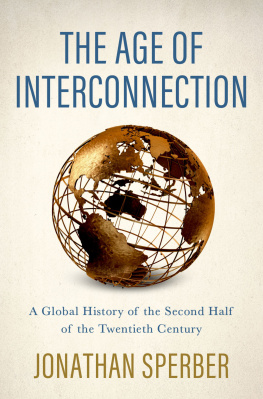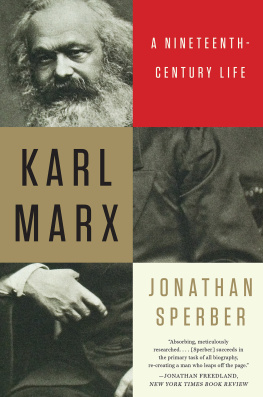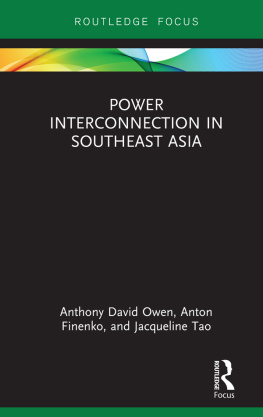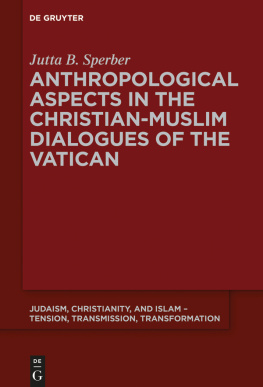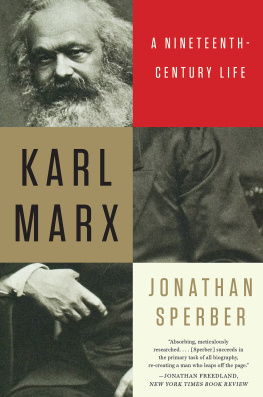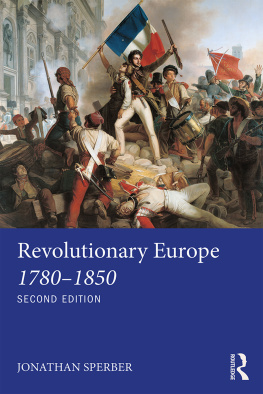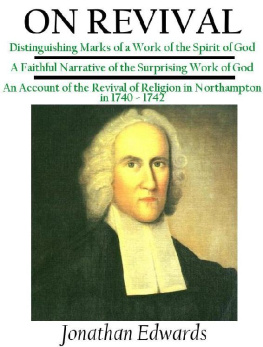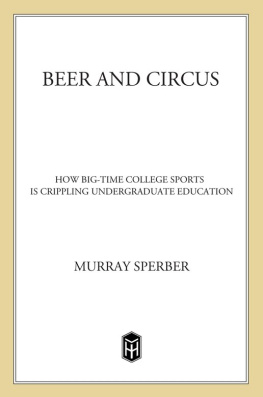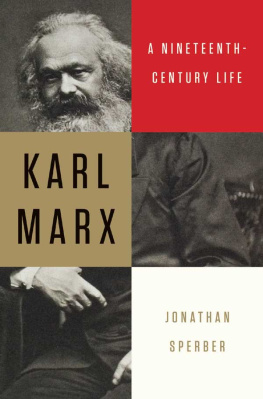Sperber Jonathan - The Age of Interconnection
Here you can read online Sperber Jonathan - The Age of Interconnection full text of the book (entire story) in english for free. Download pdf and epub, get meaning, cover and reviews about this ebook. year: 2022, publisher: Oxford University Press, Incorporated, genre: Romance novel. Description of the work, (preface) as well as reviews are available. Best literature library LitArk.com created for fans of good reading and offers a wide selection of genres:
Romance novel
Science fiction
Adventure
Detective
Science
History
Home and family
Prose
Art
Politics
Computer
Non-fiction
Religion
Business
Children
Humor
Choose a favorite category and find really read worthwhile books. Enjoy immersion in the world of imagination, feel the emotions of the characters or learn something new for yourself, make an fascinating discovery.
- Book:The Age of Interconnection
- Author:
- Publisher:Oxford University Press, Incorporated
- Genre:
- Year:2022
- Rating:4 / 5
- Favourites:Add to favourites
- Your mark:
- 80
- 1
- 2
- 3
- 4
- 5
The Age of Interconnection: summary, description and annotation
We offer to read an annotation, description, summary or preface (depends on what the author of the book "The Age of Interconnection" wrote himself). If you haven't found the necessary information about the book — write in the comments, we will try to find it.
The Age of Interconnection — read online for free the complete book (whole text) full work
Below is the text of the book, divided by pages. System saving the place of the last page read, allows you to conveniently read the book "The Age of Interconnection" online for free, without having to search again every time where you left off. Put a bookmark, and you can go to the page where you finished reading at any time.
Font size:
Interval:
Bookmark:


Oxford University Press is a department of the University of Oxford. It furthers the Universitys objective of excellence in research, scholarship, and education by publishing worldwide. Oxford is a registered trade mark of Oxford University Press in the UK and certain other countries.
Published in the United States of America by Oxford University Press
198 Madison Avenue, New York, NY 10016, United States of America.
Jonathan Sperber 2023
All rights reserved. No part of this publication may be reproduced, stored in a retrieval system, or transmitted, in any form or by any means, without the prior permission in writing of Oxford University Press, or as expressly permitted by law, by license, or under terms agreed with the appropriate reproduction rights organization. Inquiries concerning reproduction outside the scope of the above should be sent to the Rights Department, Oxford University Press, at the address above.
You must not circulate this work in any other form and you must impose this same condition on any acquirer.
Library of Congress Control Number: 2022937044
ISBN 9780190918958
eISBN 9780190918972
DOI: 10.1093/oso/9780190918958.001.0001
In the course of writing a very long book, I have received a lot of advice and encouragement. What follows is a small selection from a larger universe.
Material from this book was presented at the University of Chicago, Carnegie-Mellon University, and as the 2021 Gerald Feldman Memorial Lecture at the German Historical Institute in Washington, DC. Invitations for these opportunities were extended by Jan Goldstein, John Boyer, Donna Harsch, Simone Lssig, and Kenneth Ledford. My thanks to them and to the participants in the events for their many questions and observations. I am indebted to my colleagues in the department of history at the University of Missouri, who made unusually helpful suggestions, generously deployed their specialized knowledge, and saved me from evident blunders: Merve Fejzula, Gerrit Frank, Victor McFarland, Jay Sexton, Robert Smale, Steven Watts, and Dominic Meng-Hsuang Yang. I am particularly obligated to Catherine Rymph and John Wigger, who provided cogent criticisms of my approaches and findings; read portions of the manuscript; and, above all, listened patiently as I rambled on about my overly ambitious aspirations. Any remaining mistakes are, of course, to be attributed to me and not to them. Tim Bent of Oxford University Press demonstrated his considerable editorial skills in his work on the manuscript I submitted. As this book was going to press I received the sad news of the death of my agent, John Wright. I remember him not just for his actions on behalf of his clients but also for his dedication to the literary genre of serious nonfiction.
The writing was completed in the shadow of the COVID-19 pandemic, a particularly unpleasant example of an interconnected world. I dedicate this book to the healthcare personnel, scientists, and public health workers who have battled the pandemic, often against considerable resistance and in difficult circumstances.
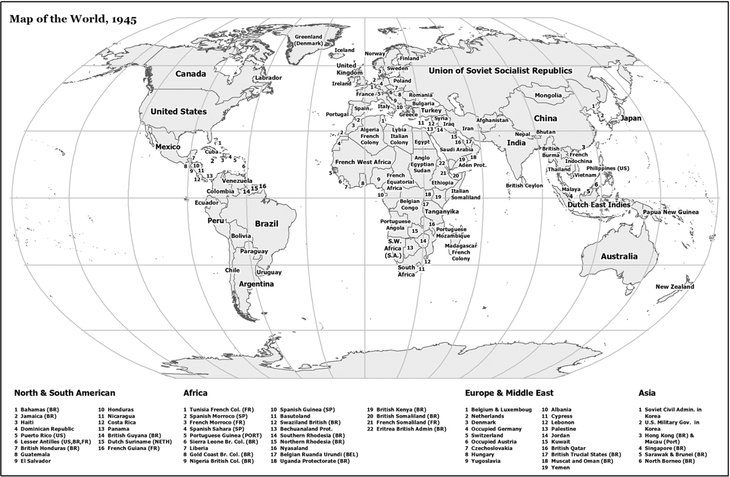
The World in 1945
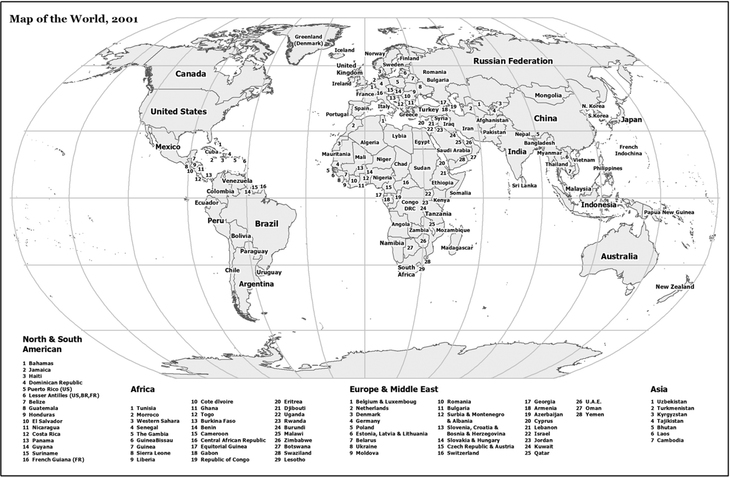
The World in 2001
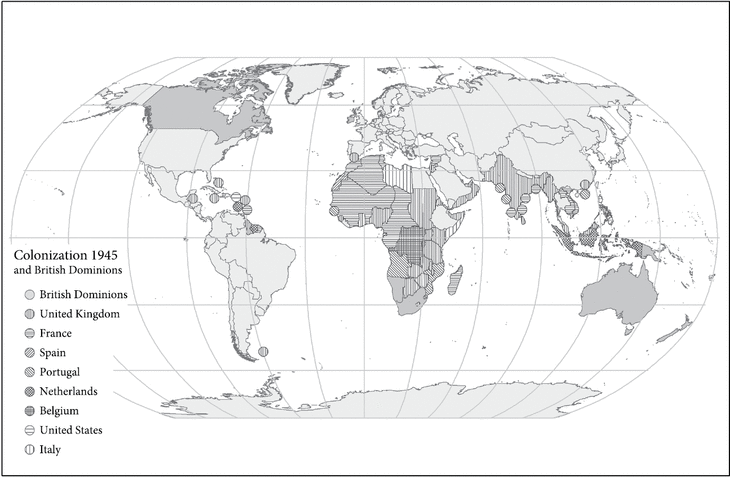
Colonial Empires in 1945
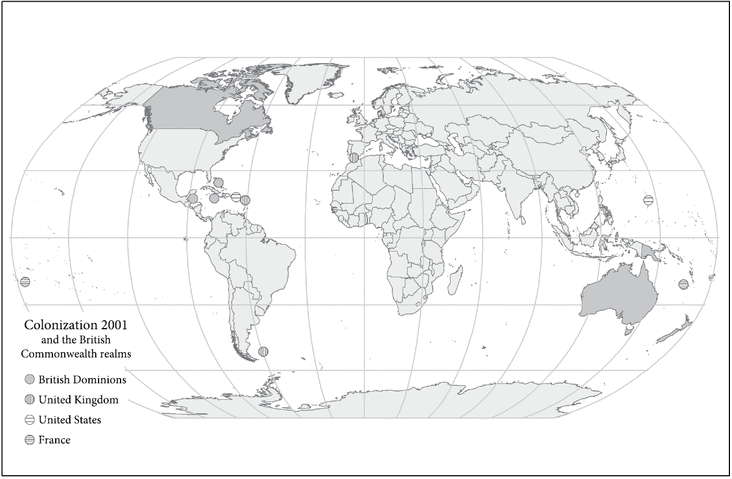
Colonial Empires in 2001
Now, in the third decade of the twenty-first century, it is time to perceive the years 19452001 as a period of human history separate and distinct from the present, in some ways rather distant from it, yet also at the origins of our contemporary condition. There is good reason to do so, since those fifty-five years between the end of the Second World War and the onset of the new millennium were a period of varied, enormous, and far-reaching transformations, from human relations with nature, to interactions of the Great Powers; from the structures of production and exchange of goods and services to the structures of religious faith. These were all changes that occurred on an increasingly global scale.
Overestimating the changes of the years between 1945 and 2001 would be difficult. Emerging from the most destructive war in human history, the world experienced a quarter century of unparalleled economic growth, along with unprecedented growth in population and in human exploitation of the biosphereonly to be followed by a period of economic crisis and then unsettling global economic, demographic, and environmental realignments. The entire five decades were an era of scientific and technological advances, eliminating deadly diseases that had killed hundreds of millions of people, uncovering the secrets of life and of the origins of the universe, expanding agricultural productivity, computing power, and worldwide communications in ways previously unimagined and even unimaginable.
Most of the second half of the twentieth century was an age of global political confrontations, when humanity teetered on the brink of extinction in a thermonuclear conflagration, while millions of combatants and civilians died in proxy conflicts across the world, and millions more through mass murder. Colonial empires covering most of the globe were dismantled, in both peaceful and violent fashion. The centuries-old worldwide domination of European countries and their former settler colonies was called into question. The all-encompassing combat that was the Cold War came to an unexpectedly peaceful end, as heavily policed authoritarian regimes suddenly collapsed before a handful of demonstrators. Hopes that the end of this global confrontation also marked the end of all major dissonances and political conflicts around the world were disappointed, most dramatically in 2001, and more gradually over the following decades.
The question for a history of the second half of the twentieth century is how to understand the nature of these transformations and to offer a narrative of their development. One answer comes from journalists and pundits who overuse phrases like globalization, the world is flat, or the singularity, all implying unprecedented and worldwide changes. Their work tends to lack historical context, flattens out the past, and fails to make distinctions between the pasteven the recent pastand the present. Historians, tracing change over time, attempt to provide a systematic account of the origins and shaping of the contemporary world, global in a double sense: worldwide and also encompassing central realms of human existence. Yet so much of global history focuses on a distant past. Responding to the contemporary realities of globalization with, for example, lovingly drawn portraits of the silk route, or of the crisis of twelfth-century monarchies, is to investigate a time when global connections were sparse, change slow and hesitant, opportunities for global comparisons few and far between, and links to the present hard to find.
Font size:
Interval:
Bookmark:
Similar books «The Age of Interconnection»
Look at similar books to The Age of Interconnection. We have selected literature similar in name and meaning in the hope of providing readers with more options to find new, interesting, not yet read works.
Discussion, reviews of the book The Age of Interconnection and just readers' own opinions. Leave your comments, write what you think about the work, its meaning or the main characters. Specify what exactly you liked and what you didn't like, and why you think so.

